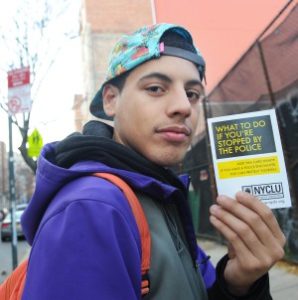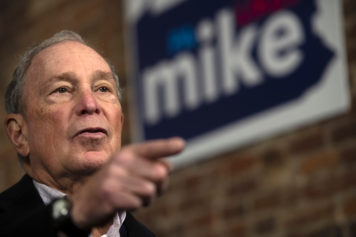
Senior student Jason Zaragoza, 18, with a pamphlet from last week’s seminar
photo: Helayne Seidman / The New York Post
Interacting with the police can be a nerve wracking and intimidating experience. Just ask any Black man.
For young people who may not know their rights, or assume they have no control over the situation, understanding how to deal with law enforcement has become vital. And so, the New York Civil Liberties Union was invited to a New York City high school to provide a two-day training session to educate students on how to interact with police last week.
East Side Community High School principal, Mark Federman, extended the invitation to the NYCLU to teach his students because they had told teachers about their bad experiences with police stops in the past, according to The New York Post.
The 450 students who attended hourlong workshops were also given a “What To Do If You’re Stopped By The Police” pamphlet.
Tips were shared such as keeping their hands out of their pockets and remaining calm during encounters with police. The NYCLU representatives also educated them about the rights they have and that they don’t have to show I.D. or consent to searches, The Post reported.
“We’re not going to candy-coat things–we have a problem in our city that’s affecting young men of color and all of our students,” Federman told The Post.
The sessions focused on the NYPD’s stop-and-frisk program and using Fourth Amendment rights while being questioned by police.
“It’s not about the police being bad,” he told The Post. “This isn’t anti-police as much as it’s pro-young people.”
Criticism of the workshops say that the sessions could deter the students from interacting with police at all.
“It’s unlikely that a high school student would come away with any other conclusion than the police are a fearful group to be avoided at all costs,” former police officer and professor at John Jay College of Criminal Justice, Eugene O’Donnell, told The Post.
President of the Sergeants Benevolent Association, Ed Mullins, wonders whether or not the message that the NYCLU is delivering is fair.
“Education is the key, but are Civil Liberties going in with an agenda or to educate?” he asks.
Mullins said that law enforcement should be given the opportunity to explain what they do and share their knowledge on how to deal with police.
“I think we deserve equal time and should have the opportunity to follow up with the same platform,” he told The Post.
This was the first time Candis Tolliver, the NYCLU’s associate director for advocacy, had addressed an entire high school, she told The Post.
“This is not about teaching kids how to get away with a crime or being disrespectful,” she said. “This is about making sure both sides are walking away from the situation safe and in control.”


